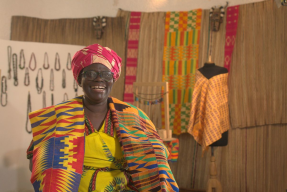
Greetings from Uganda! My name is Maura and I have been working with Life in Africa (LiA) for the past four weeks. LiA is a community based organization servicing families affected by Northern Uganda’s civil war. Approximately 80% of members belonging to the Kampala LiA Center are mothers living in the Acholi Quarters–an Internally Displaced Persons (IDP) camp. Political instability and violent rebel attacks over the past two decades have caused people to flee from the northern districts to escape persecution. Many LiA members hope to return home in the near future.
As a student studying international development, I came to Uganda to learn how microfinance programs can benefit those trying to rebuild their lives in post-conflict areas. Many people I have talked with in the IDP camps live in mud structures with tin or grass-thatched roofs. Forced from their villages into the camps, these people had to restart their lives with no means of financial support. Members of LiA access credit to purchase the fixed capital necessary to operate small-scale, income-generating businesses. Sustainable cash flows enable members to buy basic necessities. Often allocating profits involves sacrifices; food expenses, rent, and school fees tend to take priority over proper health care and medical treatment.
From my exchanges with LiA’s Kiva loan recipients, school fees are primarily cited as the average household’s greatest expenditure. And it is no surprise why. The mothers I’ve met usually care for their 4 to 8 children, in addition to supporting deceased relatives’ dependents. Some mothers lack formal schooling because their parents could not afford the fees; others were prevented from continuing classes because rebel attacks interrupted the operations of educational institutions. These mothers work unceasingly to provide their children with opportunities they were denied.
I was expecting to witness poverty in the IDP camps. I was not, however, expecting to hear so much laughter. These women are constantly singing, chatting, dancing, and poking fun at one another. Visiting a camp for the first time, I was nervous about how the local community would receive me. I do not exactly blend in as a freakishly tall, white, young western woman. Within five minutes of my arrival I was promptly christened with my Acholi name–Lakeza (meaning “grace” in Lwo)–and adorned with handmade necklaces. Although I am occasionally harassed by men on the street, generally all of the women and children I interact with have been more then friendly (especially the LiA members!).
As a Kiva Fellow, I meet with loan recipients and journal on the social impact of microfinance. Introductions alone are the most time-consuming portion of my interviews; greeting dozens of family members and even neighbors who sneak over to catch a glimpse of the mzungu (white foreigner) can take hours. After casual chatting has died down, I am typically overwhelmed with heaping plates of rice, posho (bread made from maize flour), and matokye (fried plantain). We then travel to the loan recipient’s business and I am filled in on the daily challenges entrepreneurs face.
Conversations normally start with a focus on microfinance but tend to steer towards more personal subjects. It is not my intention to pry, but the Ugandans I have met are fairly open to sharing their backgrounds and experiences–even if it means bringing up painful memories. For instance, I am shocked by how many people were abducted by or lost family members to the Lords Resistance Army (LRA). Some of the stories are quite disturbing; I find myself getting angry that so many of the horrific human rights violations in Northern Uganda never surfaced in the international media. I came to Uganda to learn how microfinance programs can be utilized in conjunction with poverty-alleviation schemes; the effects of war have added a whole new dimension to my initial curiosities about development initiatives. Although some of my initial inquiries have been satisfied, these answers have spawned an entirely new set of questions.
Last week I traveled to Gulu along with 35 LiA members from Kampala for a week long conference. I brought a few novels to occupy myself on the six hour bus ride. I did not get past page one of my book. The women were intent on transforming me into a true Acholi woman and the entire trip was dedicated to Lwo lessons (most of LiA’s members speak Lwo or Luganda) intermingled with instruction on how to create paper beads from recyclable materials. Quite the eventful bus ride, I also experienced by first Ugandan “drive-thru.” I explained that in the US, we have McDonalds; you drive up to a black box, place your order, pull forward to a window, pay, pull forward to a third stop, and receive your food. In Uganda, you pull off to the side of the road at a trading center, flocks of children run up the the bus thrusting sticks of meat, roasted cassava, fried bananas, and live chickens (yes, live!) into the bus windows. You grab whatever meets your fancy, slip a few shillings to the eagery waiting hands outside, and then the bus departs trying not to run anyone over in the process. Chaos!
After arriving in Gulu I was sent to the volunteer house to sleep. We had ten people to fit on four mattresses–a cozy living situation. Nights were spent teaching the LiA members the electric slide and other equally terrible American line dances. There is nothing like a cold bucket shower in the morning to erase feelings of drowsiness from a lack of sleep! For five days, every waking moment was spent talking with LiA members, facilitating discussions at the conference, or fielding questions by children seeking help using the internet. Writing a short email in the community center took nearly an hour to compose because I was drawn into the surrounding conversations; Ugandans love to talk! It does not take an anthropologist to notice that privacy is valued more in the US then in East Africa. During each of my two minute trips to the bathrooms I was assured to hear voices from outside the door asking “Where is Maura? Lets go find her!” In the end I have no complaints, the bonding was worth the lack of personal space.
During the evenings in Gulu I visited a night commuters center. Fearing abduction in their villages by the LRA, children walk miles by themselves to sleep in the centers each night. Hordes of thousands of children used to spend their nights at these centers, but within the last year the number has dropped significantly. Even though peace is on the horizon, because children have spent years sleeping at the centers there are often no available beds or floor space at home to stay. I also frequented the headquarters of a few other NGOs during my week in Gulu. The influx of foriegn aid in this district is incredible, but much more help is still needed.
My flight back home is scheduled for the end August. I have been consumed with my work at LiA and can’t believe that I only have about three weeks left! I hope to do a little sightseeing before heading back to the States and will make sure to post another message to the blog detailing my future adventures in Uganda!
/>













